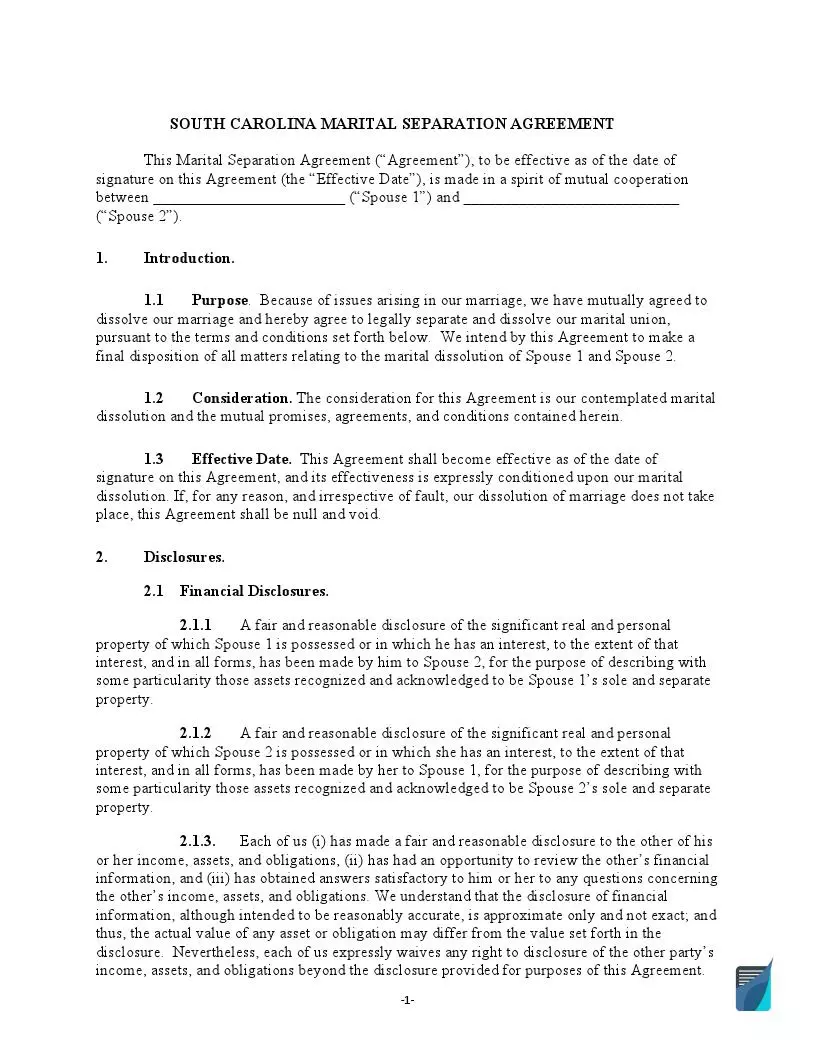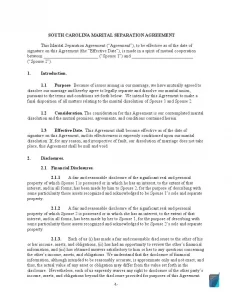South Carolina Marital Settlement (Divorce) Agreement and Legal Separation
Divorcing procedures can be tricky, complicated, and at times, very unpleasant. Furthermore, the laws regulating divorce matters in the US vary significantly from state to state. Therefore, you need to do your homework and research before filing for divorce officially. We have worked out a comprehensive analysis of all you need to know regarding divorce issues in South Carolina. Here you will find a comprehensive guide about the fillable Marital Settlement Agreement.
We strongly advise you to assess all the pros and cons and see a family counselor before proceeding. You will have to file a local Marital Settlement Agreement signed and authorized by both spouses.

Build Your Document
Answer a few simple questions to make your document in minutes
Save and Print
Save progress and finish on any device, download and print anytime
Sign and Use
Your valid, lawyer-approved document is ready
A marital settlement agreement is a legally binding contract between two partners who strongly desire to end their marriage officially. The form contains several conditions and guidelines for the ex-partners’ future actions regarding:
- Children
- Properties and assets
- Financial support
- Insurance
- Debts and liens
- Other crucial things
Contents of a Marital Settlement Agreement
There is a particular framework regarding agreements commonly applied in the United States. Here is a list of sections you cannot skip when drawing a contract with your former spouse:
A Brief Description of Parties and Their Marriage
Each marital settlement agreement begins with the names of parties willing to divorce. It continues by indicating whether the couple has a shared child, one of the spouses works in the US military, and whether the spouses have disclosed information about their assets and finances.
Properties and Support Section
The couple should define if one of the spouses is going to support the other financially. If so, the supporting spouse should specify the amount to pay monthly and for how long (until death or for a limited period).
Both spouses should then enumerate their properties and debts and specify who will pay for their insurance. If they plan to change their names back to the pre-marriage period, they can do so, but they must reflect this wish in the agreement.
Miscellaneous Conditions
If the standard template does not cover all the topics you need to include in the agreement, you can add other items individually; it is not constrained by law. For example, you can define the penalties for breaching the contract. However, bear in mind that your partner has to agree to adhere to every single provision you add to the form.
Signatures and the Date of Signing
Until the husband and the wife sign the agreement, it has no legal force.
Various Attachments
Some items contained in the agreement should be described in detail. For instance, give details of future regulations on child care, financial support, and the other parent’s visitations to the child.
Both partners should complete other supplements to disclose their assets and debts. Finally, the third attachment incorporates financial support details if one partner plans to support splitting up.
Notarization
The marital settlement agreement must be notarized. Please remember that the contract is an obligatory legal form that you should provide to the court to get divorced.
If both partners have irreconcilable differences, they can hire a mediator—a person specializing in conflict resolution—to assist them.
Our website offers advanced form-building software designed for legal template generation. We recommend using it to obtain the correct South Carolina marital settlement agreement form quickly and effortlessly.
Requirements and state legal regulations for divorce differ in all US states. Below are the current laws related to the divorce process in South Carolina.
South Carolina Divorce and Separation Laws
The South Carolina Code of Laws offers regulations governing divorce cases in the state. The provisions are provided in Chapter 3 of the Code, also referred to as “Divorce.” From the sections of this Chapter, you can determine the reasons for divorce, rules regarding division of common property, and regulations regarding fostering children in the state.
Other related laws are available in Title 63, Chapter 17 of the Code (Paternity and Child Support).
Grounds for Divorce
There are two types of reasons for divorce: no-fault and fault. In South Carolina, Section 20-3-10 of the State Code lists the lawful causes to get divorced.
A no-fault cause for divorce involves partners living separately for one year or more. Other reasons considered “fault” include cheating, physical abuse, one of the partner’s absence for a year or more, and an unhealthy drinking habit or drug addiction.
Property Division
According to Section 20-3-620, the couple should split their mutual assets should be divided fairly based on such factors as each partner’s health condition and annual earnings. So, there is no equal sharing of properties by law.
Child Custody and Visitation
Section 20-3-160 allows the court to decide on the child’s custody during the divorce procedures and even the divorce. All decisions have to guarantee the child’s safety and prosperity and protect their interests.
Popular Local Marital Settlement Agreement Forms
A divorce settlement agreement, often known as a property settlement agreement (PSA), is a great tool that could help you settle the divorce process and reduce undesired hassle. Listed here are the states where people look for this template the most.
Child Support and Alimony
The South Carolina Department of Social Service s has issued a special guide with detailed instructions and provisions on child support matters. It guides the courts to determine the amount of alimony and other details regarding child support. If the court decides not to use the guide, there should be a solid and proven reason.
Moreover, Section 63-17-470 of the Code of Laws and Chapter 114 of the South Carolina Code of State Regulations offer provisions that the court needs to make the right decision.
Legal Separation
In some American states, a married couple has a legal status called “legal separation.” A legally separated couple can live separately without getting a divorce. This rule comes in handy when a couple has children, and it is more convenient to stay married for some other mutual perks. Legal separation is also suitable when a couple is unsure whether they have to get divorced or if their religion does not allow divorce.
In South Carolina, a couple cannot legally obtain this status. As a couple, you are either married or divorced—there is no third option. Although there is no status in between, your relationships can be settled with a Separation Agreement similar to the South Carolina Marital Settlement Agreement.
Remember that divorce may lead to massive stress (especially for shared kids) regardless of the relations between you and your partner. Sometimes, concluding the divorce process brings relief, but the paperwork, fees, and necessity to visit the court can be incredibly challenging.
All in all, if you have made your final decision, we have prepared the guidelines on how to file for divorce in South Carolina from start to end.

Filing for Divorce in South Carolina
Your county’s Family Court is responsible for reviewing divorce cases in South Carolina. Divorce filing will cost you $150, and you have to wait for at least one before the divorce ruling. Use the instructions below to deal with the whole process successfully.
South Carolina authorities can only perform divorce procedures for their residents, which effectively means that the divorcing couple must have officially lived in the state for at least one year.
1. Define the Reasons for Divorce
We have already explained the difference between “fault” and “no-fault” divorce. If partners initiate a divorce process caused by a “no-fault” factor, it gets a bit easier, and the case is automatically considered uncontested.
If the reason for filing is one of the “fault” factors, there is an increase in the fees paid and the paperwork involved. The same happens when one spouse refuses to sign the papers issued (see step 4 below). Such cases are called “contested.”
2. Make Your Marital Settlement Agreement
The spouses should discuss their future and draw an agreement.
3. Submit the Documents to Court
Couples should file five compulsory forms in court: Summons, Complaint, Family Court Cover Sheet, Financial Declaration, and Certificate of Exemption. Only one of them—the declaration—requires a notary public agent’s verification.
In South Carolina, one of the spouses fills out the forms and takes them to court. This person is also referred to as the plaintiff. If they want to change their name after the divorce, they should state it in the Complaint form. The court clerk then registers the application, and the plaintiff should cover the court fee.
4. Deliver the Papers to Your Partner
Your partner should receive all the forms you have submitted to the court. There are five ways to send the papers: via regular mail, delivery service (for instance, DHL), the local sheriff, personal service, or a private process server. Regardless of the delivery method, the recipient should sign a paper showing that they have received the delivery.
Your partner should also reply by completing a specific form. If they want to change their name, they can state so in this response.
The plaintiff has to sign the Affidavit of Service as evidence of delivery. In the form, the plaintiff indicates the delivery method. The paper must be notarized.
5. Expect the Hearing
Once your partner has sent their response, you must submit another form to the court—the Request for Hearing. You will then be notified at least ten days before the hearing.
The last two records you file to the court are the Report of Divorce or Annulment of Marriage form and the Final Order of Divorce template. It should happen before the trial.
It is advisable to bring at least one witness to verify that you and your partner have been living apart for no less than a year.
The judge will listen to both parties, and if there are no problems with the documents, they will approve the divorce. The name change occurs after the trial.

Here are various other South Carolina documents filled out by FormsPal visitors. Try out our step-by-step builder to customize any of these documents to your needs.
Other Marital Settlement Agreement Forms by State